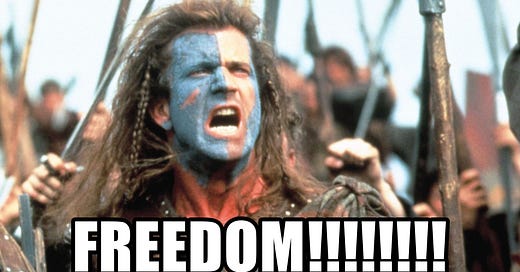I’ve long been puzzled by libertarian reverence for “the rule of law.” Why should friends of freedom care about the laws passed by the foolish and evil people who habitually rule over us? We should instead stubbornly put justice before the law. As Thoreau timelessly put in it “Civil Disobedience”:
Must the citizen ever for a moment, or in the least degree, resign his conscience to the legislation? Why has every man a conscience, then? I think that we should be men first, and subjects afterward. It is not desirable to cultivate a respect for the law, so much as for the right. The only obligation which I have a right to assume is to do at any time what I think right.
What about the conventional view that you should follow unjust laws while striving with all your might to change them? This is an absurdly demanding standard. The vast majority of humans couldn’t change a single law with a lifetime of maximum effort. The same goes, of course, for the Kingian view that if you break an unjust law, you should publicly accept the punishment. If that’s your only option, your least bad option is just knuckling under to the oppression of the world.
What’s the alternative? Being a righteous scofflaw. Follow just laws. Break unjust laws when the expected gains are positive. The latter happens surprisingly often, because the demagogues who rule us know that the public is often too squeamish to support draconian punishments.
Though I knew all this long before Covid, it was global Covid tyranny that brought these truths into focus. Governments in practically every country stripped us of basic freedoms with barely a shred of cost-benefit analysis. My ability to change these policies was near-zero. But I did have one highly effective way to win back my freedom: Disobey the law. Sometimes this lead to token punishments, like a censorious admonition back by an implicit threat of escalation. Most of the time, however, I totally got away with it, carving out a little extra freedom in our unfree world.
The lesson: When the government oppresses you, you don’t have to submit. You don’t have to make a futile effort to fix the system. And you don’t have to play the victim. You always have the final freedom to be a scofflaw. True, you could use this as a rationalization for wrong-doing, but I doubt you will. If you’re reading this, I think you want to be free. While exercising your final freedom will not actually make you free, it will almost certainly make you more free. Please try it and see.
Subscribe to Bet On It
Caplan and Candor










I think the virtue of the rule of law is in contrast to the rule of men in how those in power behave, i.e. there being pre-agreed upon rules laid out that people know to follow and can point to when some debate of wrong doing arises, as opposed to whomever is in power at the moment getting to arbitrarily make up what the rules are. Rule of Law describes the behaviors of those in power, not necessarily the obligations of the subjects.
What we saw with the COVID mess was a good example of not having the rule of law. Officials passed arbitrary mandates and requirements with highly questionable legal backing to their right to do so. If mandating e.g. work places demand employees get vaccines or be fired was legal, they wouldn't have had OSHA try to enforce it. If they were following the rule of law they would have been able to point to exactly what paragraph in the legislation said "We can do this".
You are quite correct that there is no moral reason to comply with unjust laws. Importantly, just like regularly enforced laws are evidence for the justice of the law, the lack of Rule of Law is evidence for the injustice of demands from those in power. If those in power cannot or will not put their rules in place through the agreed upon processes for doing so, that is very strong evidence for not obeying being morally preferable.
I can't see any bright line between, Laws, Rules, Protocols and operating guidelines. I also can't see a fundamental difference between unjust laws and a bunch of dumb-ass rules that just piss me off.
Libertarians never seem to use examples of people working on large projects that require a high degree of co-ordination and co-operation between a large number of people. Isn't that what a society IS ? The construction worker doesn't get to ignore the building plan because there's a bunch of dumb stuff in it he doesn't understand, nor the soldier in the army, nor the sailor on board ship.
A decision to ignore the rules could only rationally be made on the basis of having the information that hardly anyone ever has. Your decision to break the rules and do your own thing might not be a cover for evil doing but could very easily be a cover for simple laziness that gets disguised with self serving righteousness.